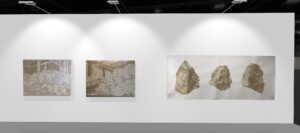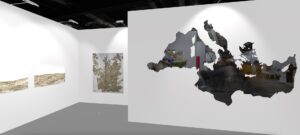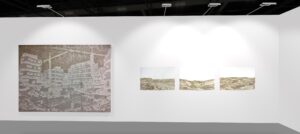On the fence
The ARCOmadrid E-xhibition is presented as a virtual space, a kind of psychic representation that allows Jean Denant (Sète, France, 1979) to inscribe a mental cartography of his research.

La Traversée, a border work that separates the real from the imaginary, conscious and unconscious, represents a map of the Mediterranean in a polished stainless steel mirror, embedded in the wall, a living work that feeds and evolves with the passage of light and look.
Border between two worlds, La Traversée is the representation of reality that accompanies the archaeological traces of the artist’s passage, like men in the course of time.
Memory of exchanges in its waters, where Gauls and Romans were already fighting for the borders, a necklace of amphora rubble reminds us of the memory of exchanges between men found at the bottom of the seas.
Greek heroes have also passed through it and left their mark. The necklace of this Giant, as a vestige of mythological tales, tells us that it is in this geographical space where peoples mixed, shared their beliefs and invented their gods.
This Mediterranean, here presented as a continent, is also considered a border, sometimes as an insurmountable wall.
In Jean Denant’s work, everything is a question of construction and deconstruction, as in the Anarchitecture works that he also presents. This place, at the same time an intimate landscape that is being built and a real landscape that is being made, comes to set our gaze once again on the border, the passage from one state to another.

Like these drawings of landscapes in Palestine, the cradle of our civilization, drawings painted in cement on paper, which constitute the series États limites, in reference to this psychic organization “between two waters”, between neurosis and psychosis, which allows us to link this universal landscape, the center of our civilization, and an intimate landscape.
Jean Denant navigates between two waters in an attempt to express the fragility of the border issue, both physical and psychological, from a universal and at the same time unique point of view.
Text by Gaëlle Combes
